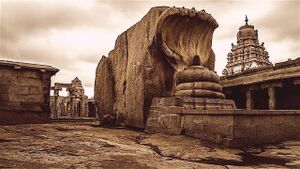Novalithic Age: Difference between revisions
Philimania (talk | contribs) (Created page with "{{Region_icon_Gentu}} {{Gentu wip}} {{Infobox archaeological culture |name = Novalithic |map = File:Temple.jpg |mapcaption = Ruins of the XXX temple in modern...") |
Philimania (talk | contribs) mNo edit summary |
||
| (6 intermediate revisions by the same user not shown) | |||
| Line 4: | Line 4: | ||
|name = Novalithic | |name = Novalithic | ||
|map = File:Temple.jpg | |map = File:Temple.jpg | ||
|mapcaption = Ruins of the | |mapcaption = Ruins of the X temple in modern day X, X. | ||
|mapalt = | |mapalt = | ||
|altnames = | |altnames = | ||
| Line 10: | Line 10: | ||
|region = | |region = | ||
|period = [[Prehistorical Era]] | |period = [[Prehistorical Era]] | ||
|dates = | |dates = 8,000-5,500 BCE | ||
|typesite = | |typesite = | ||
|majorsites = | |majorsites = | ||
| Line 19: | Line 19: | ||
{{Gentish History}} | {{Gentish History}} | ||
The '''Novalithic Age''' is the second period of the [[Prehistorical Era]] and is characterised by the emergence of large scale farming around the 8th millennium BCE and fixed human settlements. The period lasted from around | The '''Novalithic Age''' is the second period of the [[Prehistorical Era]] and is characterised by the emergence of large scale farming around the 8th millennium BCE and fixed human settlements. The period lasted from around 7,000 to about 5,000 BCE with the transitioning to the [[Cuprulithic Age]] marked by the development of metallurgy, leading up to the [[Bronze Age]] and [[Iron Age]]. The Novalithic also introduced the [[Novalithic Revolution]], comprising a progression of behavioral and cultural characteristics and changes. | ||
The term "Novalithic" derives from the [[Palon language|Palon]] word "nova" which is the feminine version of "novo" which translates to "new"; and the [[Pylosan language|Pylosan]] λίθος, lithos, "stone", literally 'New Stone Age'. The term was coined by | The term "Novalithic" derives from the [[Palon language|Palon]] word "nova" which is the feminine version of "novo" which translates to "new"; and the [[Pylosan language|Pylosan]] λίθος, lithos, "stone", literally 'New Stone Age'. The term was coined by X in 1859. | ||
== History by region == | == History by region == | ||
| Line 132: | Line 132: | ||
{{Template:GentuInfo}} | {{Template:GentuInfo}} | ||
[[Category:Novalithic Age]] | |||
Latest revision as of 16:46, 21 January 2023
This article is a work in progress. Any information here may not be final as changes are often made to make way for improvements or expansion of lore-wise information about Gentu. Please comment on this article's talk page to share your input, comments and questions. Note: To contribute to this article, contact User:Philimania. |
 Ruins of the X temple in modern day X, X. | |
| Period | Prehistorical Era |
|---|---|
| Dates | 8,000-5,500 BCE |
| Preceded by | Vetuslithic Age |
| Followed by | Cuprulithic Age |
| Part of a series on the |
| History of Gentu and Gentish human history (Hodiernus epoch) |
|---|
| ↑ before Homo (Septun epoch) |
|
Prehistorical Era (one-era three-age system) |
|
| Ancient Era |
|
| Antiquity Era |
|
| Middle Era |
|
| Modern Era |
|
| ↓ Future |
The Novalithic Age is the second period of the Prehistorical Era and is characterised by the emergence of large scale farming around the 8th millennium BCE and fixed human settlements. The period lasted from around 7,000 to about 5,000 BCE with the transitioning to the Cuprulithic Age marked by the development of metallurgy, leading up to the Bronze Age and Iron Age. The Novalithic also introduced the Novalithic Revolution, comprising a progression of behavioral and cultural characteristics and changes.
The term "Novalithic" derives from the Palon word "nova" which is the feminine version of "novo" which translates to "new"; and the Pylosan λίθος, lithos, "stone", literally 'New Stone Age'. The term was coined by X in 1859.
History by region
Hesterath
Hesterath lowlands
TBA
Plevapotamia
TBA
Kharankhui Highlands
TBA
Northern Hesterath
TBA
Sub-Exore
TBA
Naphtora
Northern Naphtora
TBA
Central & eastern Naphtora
TBA
Southern Naphtora
TBA
Kukan peninsula & western Naphtora
TBA
Oranland
Western Oranland
TBA
Southern Oranland
TBA
Eastern Oranland
TBA
Central & northern Oranland
TBA
Alabon
TBA
Trimeshia
TBA
Domicas
North Domica
TBA
Central Domica
TBA
South Domica
TBA
Cultural characteristics
Social organization
TBA
Agriculture
TBA
Clothing
TBA
List of early settlements
TBA
List of cultures and sites
TBA
See also

